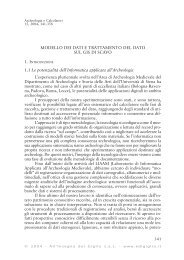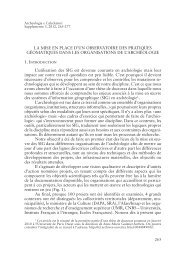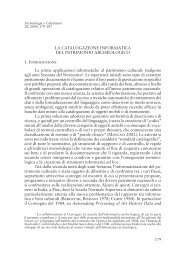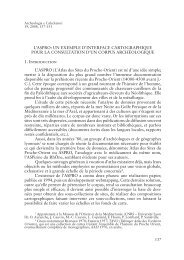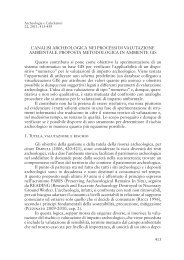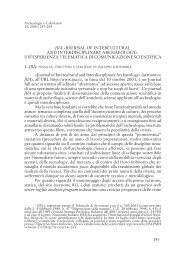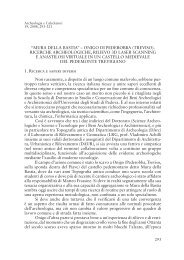- Page 2 and 3:
ARCHEOLOGIA E CALCOLATORI CNR - Dip
- Page 4 and 5:
Volume edito in collaborazione con
- Page 6 and 7:
A. Polcaro, V.F. Polcaro, Man and s
- Page 8 and 9:
La naissance de l’informatique en
- Page 10 and 11:
Ai problemi dei rapporti tra archeo
- Page 12 and 13:
E. Vesentini Ma, al di là di quest
- Page 14 and 15:
E. Vesentini 3. La Scuola Normale S
- Page 17 and 18:
Archeologia e Calcolatori 20, 2009,
- Page 19 and 20:
Informatica archeologica e non arch
- Page 21 and 22:
Informatica archeologica e non arch
- Page 23 and 24:
Informatica archeologica e non arch
- Page 25 and 26:
Informatica archeologica e non arch
- Page 27 and 28:
Archeologia e Calcolatori 20, 2009,
- Page 29 and 30:
From anarchy to good practice: the
- Page 31 and 32:
From anarchy to good practice: the
- Page 33 and 34:
From anarchy to good practice: the
- Page 35:
From anarchy to good practice: the
- Page 38 and 39:
D. Kurtz Fig. 2 - The Beazley Archi
- Page 40 and 41:
D. Kurtz Fig. 4 - The Ioannou Schoo
- Page 42 and 43:
D. Kurtz Fig. 6 - The Beazley Archi
- Page 44 and 45:
D. Kurtz Fig. 8 - http: // www.cvao
- Page 46 and 47:
D. Kurtz In the summer of 2008 we b
- Page 48 and 49:
P. Sommella che promosse, sotto l
- Page 50 and 51:
P. Sommella v’è oggi risposta vi
- Page 52 and 53:
P. Sommella ricerca per anni relega
- Page 54 and 55:
P. Sommella Ovviamente ciò che è
- Page 56 and 57:
P. Sommella teso in rete all’ediz
- Page 58 and 59:
P. Sommella Consalvi F. 2009, Il Ce
- Page 61 and 62:
Archeologia e Calcolatori 20, 2009,
- Page 63 and 64:
The golden years for mathematics an
- Page 65 and 66:
The golden years for mathematics an
- Page 67 and 68:
The golden years for mathematics an
- Page 69 and 70:
The golden years for mathematics an
- Page 71 and 72:
The golden years for mathematics an
- Page 73:
The golden years for mathematics an
- Page 76 and 77:
G. Lock computer programs the more
- Page 78 and 79:
G. Lock The importance of models ha
- Page 80 and 81:
G. Lock of technological determinis
- Page 82 and 83:
G. Lock it is possible to link peop
- Page 84 and 85:
G. Lock Lock G., Stančič Z. (eds.
- Page 86 and 87:
G. Semeraro 2. Gestione dei dati di
- Page 88 and 89:
G. Semeraro 3. GIS e dinamiche inse
- Page 90 and 91:
G. Semeraro lmati è stato realizza
- Page 92 and 93:
G. Semeraro Fig. 3 - Gli attori “
- Page 94 and 95:
G. Semeraro D’Andria F. (ed.) 199
- Page 96 and 97:
J.A. Barceló man acts are not divi
- Page 98 and 99:
J.A. Barceló the search for hypoth
- Page 100 and 101:
J.A. Barceló The rst synthetic mod
- Page 102 and 103:
J.A. Barceló data within the conse
- Page 104 and 105:
J.A. Barceló well-dened operators
- Page 106 and 107:
J.A. Barceló 6. Conclusions The fa
- Page 108 and 109:
J.A. Barceló Gardin J.-C. 1994, In
- Page 111 and 112:
Archeologia e Calcolatori 20, 2009,
- Page 113 and 114:
Representing knowledge in archaeolo
- Page 115 and 116:
Representing knowledge in archaeolo
- Page 117 and 118:
Representing knowledge in archaeolo
- Page 119 and 120:
Representing knowledge in archaeolo
- Page 121 and 122:
Representing knowledge in archaeolo
- Page 123 and 124:
Representing knowledge in archaeolo
- Page 125 and 126:
Representing knowledge in archaeolo
- Page 127 and 128:
Representing knowledge in archaeolo
- Page 129 and 130:
Archeologia e Calcolatori 20, 2009,
- Page 131 and 132:
Museo Virtuale dell’Informatica:
- Page 133 and 134:
Museo Virtuale dell’Informatica:
- Page 135 and 136:
Museo Virtuale dell’Informatica:
- Page 137 and 138:
Museo Virtuale dell’Informatica:
- Page 139 and 140:
Museo Virtuale dell’Informatica:
- Page 141 and 142:
Museo Virtuale dell’Informatica:
- Page 143 and 144:
Museo Virtuale dell’Informatica:
- Page 145 and 146:
Archeologia e Calcolatori 20, 2009,
- Page 147 and 148:
«Archeologia e Calcolatori»: le r
- Page 149 and 150:
«Archeologia e Calcolatori»: le r
- Page 151 and 152:
«Archeologia e Calcolatori»: le r
- Page 153 and 154:
«Archeologia e Calcolatori»: le r
- Page 155 and 156:
Archeologia e Calcolatori 20, 2009,
- Page 157 and 158:
Provando e riprovando: un quarto di
- Page 159 and 160:
Provando e riprovando: un quarto di
- Page 161 and 162:
Provando e riprovando: un quarto di
- Page 163 and 164:
Provando e riprovando: un quarto di
- Page 165 and 166:
Provando e riprovando: un quarto di
- Page 167 and 168:
Provando e riprovando: un quarto di
- Page 169 and 170:
Archeologia e Calcolatori 20, 2009,
- Page 171 and 172:
Punto di non-ritorno (Cartograa num
- Page 173 and 174:
Punto di non-ritorno (Cartograa num
- Page 175 and 176:
Punto di non-ritorno (Cartograa num
- Page 177:
Punto di non-ritorno (Cartograa num
- Page 180 and 181:
A. Caravale Documents, con la ricch
- Page 182 and 183:
A. Caravale e si sono occupati di t
- Page 184 and 185:
A. Caravale ritage 12 . Finalizzato
- Page 186 and 187:
A. Caravale Barocchi P., Fileti Maz
- Page 189 and 190:
Archeologia e Calcolatori 20, 2009,
- Page 191 and 192:
Da Te.m.p.l.a. al Centro di Ricerca
- Page 193 and 194:
Da Te.m.p.l.a. al Centro di Ricerca
- Page 195 and 196:
Da Te.m.p.l.a. al Centro di Ricerca
- Page 197 and 198:
Da Te.m.p.l.a. al Centro di Ricerca
- Page 199 and 200:
Da Te.m.p.l.a. al Centro di Ricerca
- Page 201 and 202:
Da Te.m.p.l.a. al Centro di Ricerca
- Page 203 and 204: Da Te.m.p.l.a. al Centro di Ricerca
- Page 205 and 206: Archeologia e Calcolatori 20, 2009,
- Page 207 and 208: From artefact typologies to cultura
- Page 209 and 210: From artefact typologies to cultura
- Page 211 and 212: From artefact typologies to cultura
- Page 213 and 214: From artefact typologies to cultura
- Page 215 and 216: From artefact typologies to cultura
- Page 217 and 218: From artefact typologies to cultura
- Page 219 and 220: From artefact typologies to cultura
- Page 221: From artefact typologies to cultura
- Page 224 and 225: A. Polcaro, V.F. Polcaro gist, who
- Page 226 and 227: A. Polcaro, V.F. Polcaro “Megalit
- Page 228 and 229: A. Polcaro, V.F. Polcaro the North
- Page 230 and 231: A. Polcaro, V.F. Polcaro 4.1 Positi
- Page 232 and 233: A. Polcaro, V.F. Polcaro the Moon p
- Page 234 and 235: A. Polcaro, V.F. Polcaro spani 2006
- Page 236 and 237: A. Polcaro, V.F. Polcaro Fig. 1 - T
- Page 238 and 239: A. Polcaro, V.F. Polcaro in progres
- Page 240 and 241: A. Polcaro, V.F. Polcaro by the ana
- Page 242 and 243: A. Polcaro, V.F. Polcaro however, o
- Page 244 and 245: A. Polcaro, V.F. Polcaro Judge W.J.
- Page 247 and 248: Archeologia e Calcolatori 20, 2009,
- Page 249 and 250: Digitization as a science process o
- Page 251 and 252: Digitization as a science world and
- Page 253: Digitization as a science fact lays
- Page 257 and 258: Digitization as a science libraries
- Page 259: Digitization as a science ABSTRACT
- Page 262 and 263: K.A. Niknami, A.C. Amirkhiz, F.F. J
- Page 264 and 265: K.A. Niknami, A.C. Amirkhiz, F.F. J
- Page 266 and 267: K.A. Niknami, A.C. Amirkhiz, F.F. J
- Page 268 and 269: K.A. Niknami, A.C. Amirkhiz, F.F. J
- Page 270 and 271: K.A. Niknami, A.C. Amirkhiz, F.F. J
- Page 272 and 273: K.A. Niknami, A.C. Amirkhiz, F.F. J
- Page 274 and 275: K.A. Niknami, A.C. Amirkhiz, F.F. J
- Page 276 and 277: K.A. Niknami, A.C. Amirkhiz, F.F. J
- Page 278 and 279: S.J. Kay, R.E. Witcher Fig. 1 - Loc
- Page 280 and 281: S.J. Kay, R.E. Witcher identify pat
- Page 282 and 283: S.J. Kay, R.E. Witcher The WofE mod
- Page 284 and 285: S.J. Kay, R.E. Witcher Fig. 2 - Pre
- Page 286 and 287: S.J. Kay, R.E. Witcher Perhaps the
- Page 288 and 289: S.J. Kay, R.E. Witcher is directed
- Page 290 and 291: S.J. Kay, R.E. Witcher Wheatley D.,
- Page 292 and 293: A. Casarotto, A. De Guio, F. Ferrar
- Page 294 and 295: A. Casarotto, A. De Guio, F. Ferrar
- Page 296 and 297: A. Casarotto, A. De Guio, F. Ferrar
- Page 298 and 299: A. Casarotto, A. De Guio, F. Ferrar
- Page 300 and 301: A. Casarotto, A. De Guio, F. Ferrar
- Page 302 and 303: A. Casarotto, A. De Guio, F. Ferrar
- Page 304 and 305:
A. Casarotto, A. De Guio, F. Ferrar
- Page 306 and 307:
A. Casarotto, A. De Guio, F. Ferrar
- Page 309 and 310:
Archeologia e Calcolatori 20, 2009,
- Page 311 and 312:
Un modello GIS multicriterio Area d
- Page 313 and 314:
Un modello GIS multicriterio ne di
- Page 315 and 316:
Un modello GIS multicriterio dover
- Page 317 and 318:
Un modello GIS multicriterio territ
- Page 319 and 320:
Un modello GIS multicriterio 5.4 I
- Page 321 and 322:
Fig. 4 - Siti noti e aree di interv
- Page 323 and 324:
Un modello GIS multicriterio Per l
- Page 325 and 326:
Un modello GIS multicriterio Saaty
- Page 327 and 328:
X 5 (pendenza) X 6 (esposizione) X
- Page 329:
Un modello GIS multicriterio Buonoc
- Page 332 and 333:
G. Bigliardi la programmazione dei
- Page 334 and 335:
G. Bigliardi livelli è, inoltre, p
- Page 336 and 337:
G. Bigliardi Fig. 3 - Particolare d
- Page 338 and 339:
G. Bigliardi Fig. 4 - Particolare d
- Page 340 and 341:
G. Bigliardi connessa esclusivament
- Page 342 and 343:
G. Bigliardi centuriale certo o ipo
- Page 344 and 345:
G. Bigliardi (un canale moderno e u
- Page 346 and 347:
G. Bigliardi Fig. 8 - Carta della P
- Page 348 and 349:
G. Bigliardi fornaci. Successivamen
- Page 350 and 351:
G. Bigliardi Clack P., Hazelgrove S
- Page 352 and 353:
M. Frassine, A. Bezzi, M. Fabris, V
- Page 354 and 355:
M. Frassine, A. Bezzi, M. Fabris, V
- Page 356 and 357:
M. Frassine, A. Bezzi, M. Fabris, V
- Page 358 and 359:
M. Frassine, A. Bezzi, M. Fabris, V
- Page 360 and 361:
M. Frassine, A. Bezzi, M. Fabris, V
- Page 362 and 363:
M. Frassine, A. Bezzi, M. Fabris, V
- Page 364 and 365:
M. Frassine, A. Bezzi, M. Fabris, V
- Page 366 and 367:
M. Frassine, A. Bezzi, M. Fabris, V
- Page 368 and 369:
M. Frassine, A. Bezzi, M. Fabris, V
- Page 370 and 371:
M. Frassine, A. Bezzi, M. Fabris, V
- Page 372 and 373:
M. Frassine, A. Bezzi, M. Fabris, V
- Page 374 and 375:
N. Lombardo Per le oggettive difcol
- Page 376 and 377:
N. Lombardo Discesi i due gradini c
- Page 378 and 379:
N. Lombardo Fig. 3 - Interno dell
- Page 380 and 381:
N. Lombardo Fig. 4 - Interno del te
- Page 382 and 383:
N. Lombardo Fig. 6 - La scheda di i
- Page 384 and 385:
N. Lombardo Certamente, a giudicare
- Page 386 and 387:
N. Lombardo biamo rivestito le pare
- Page 388 and 389:
N. Lombardo Fig. 11 - Cortile-pales
- Page 390 and 391:
N. Lombardo Fig. 13 - Facciata del
- Page 392 and 393:
N. Lombardo Fig. 14 - Interno del n
- Page 394 and 395:
N. Lombardo e occidentale del ninfe
- Page 396 and 397:
N. Lombardo BIBLIOGRAFIA Borra D. 2
- Page 398 and 399:
L. Palmieri 2. “Progetto Calvaton
- Page 400 and 401:
L. Palmieri dedica agli imperatori
- Page 402 and 403:
L. Palmieri ricerche nell’area de
- Page 404 and 405:
L. Palmieri due complessi residenzi
- Page 406 and 407:
L. Palmieri graca attraverso lingua
- Page 408 and 409:
L. Palmieri presente nei contesti d
- Page 410 and 411:
L. Palmieri che compare al passaggi
- Page 412 and 413:
L. Palmieri “Labirinto”, colloc
- Page 414 and 415:
L. Palmieri Fig. 7 - Esempio di gal
- Page 416 and 417:
L. Palmieri L’archivio contenente
- Page 418 and 419:
L. Palmieri Lorenzi J. 1996, Il ter
- Page 421 and 422:
Archeologia e Calcolatori 20, 2009,
- Page 423 and 424:
Recensioni stato sviluppato dal Lab
- Page 425 and 426:
Recensioni Inne, notevole è l’at
- Page 427:
Recensioni portano alla realizzazio



